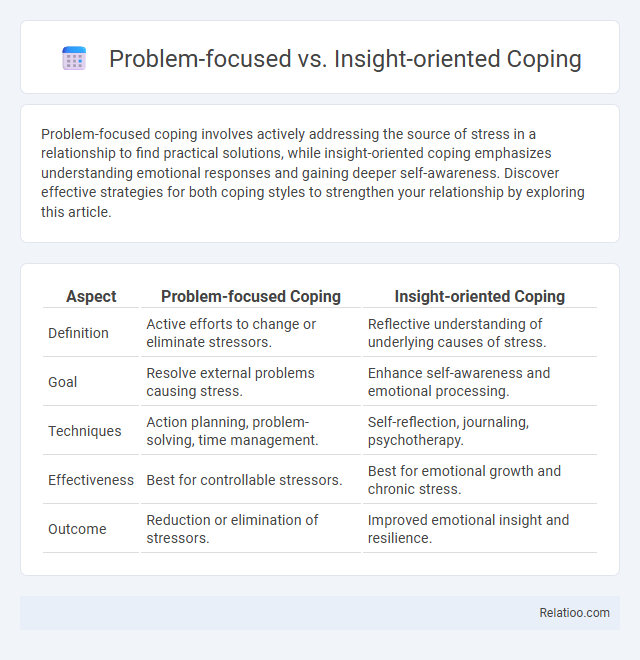Problem-focused coping involves actively addressing the source of stress in a relationship to find practical solutions, while insight-oriented coping emphasizes understanding emotional responses and gaining deeper self-awareness. Discover effective strategies for both coping styles to strengthen your relationship by exploring this article.
Table of Comparison
| Aspect | Problem-focused Coping | Insight-oriented Coping |
|---|---|---|
| Definition | Active efforts to change or eliminate stressors. | Reflective understanding of underlying causes of stress. |
| Goal | Resolve external problems causing stress. | Enhance self-awareness and emotional processing. |
| Techniques | Action planning, problem-solving, time management. | Self-reflection, journaling, psychotherapy. |
| Effectiveness | Best for controllable stressors. | Best for emotional growth and chronic stress. |
| Outcome | Reduction or elimination of stressors. | Improved emotional insight and resilience. |
Introduction to Coping Strategies
Problem-focused coping involves actively addressing the source of stress through practical solutions and behavioral changes, enhancing your ability to manage challenges effectively. Insight-oriented coping emphasizes self-awareness and understanding emotional responses to stress, promoting long-term psychological growth and emotional regulation. Combining both strategies allows for a balanced approach where immediate problems are resolved while deeper personal insights foster resilience and adaptive coping skills.
Defining Problem-Focused Coping
Problem-focused coping involves active strategies aimed at directly addressing and resolving the sources of stress by identifying specific problems and implementing practical solutions. It emphasizes controlling or eliminating stressors through actions such as planning, seeking information, or changing behaviors. This coping style contrasts with insight-oriented coping, which prioritizes understanding emotional responses and gaining self-awareness rather than immediate problem resolution.
Understanding Insight-Oriented Coping
Insight-oriented coping emphasizes self-awareness and cognitive restructuring to better understand the root causes of stress, promoting emotional growth and long-term resilience. Problem-focused coping targets external stressors through practical solutions and action plans to directly reduce or eliminate the source of stress. Understanding insight-oriented coping involves recognizing internal thought patterns and emotional responses, facilitating deeper psychological insight and adaptive behavioral changes.
Key Differences Between Coping Approaches
Problem-focused coping targets specific stressors by actively addressing and modifying the source of stress through practical solutions, promoting immediate control over difficult situations. Insight-oriented coping emphasizes understanding the underlying emotional or psychological causes of stress, fostering self-awareness and long-term emotional growth. Key differences lie in their approach: problem-focused coping deals with external factors and actionable steps, while insight-oriented coping delves into internal processes and emotional insight to manage stress.
Psychological Theories Behind Each Strategy
Problem-focused coping centers on actively addressing stressors by developing practical solutions, rooted in Lazarus and Folkman's Stress and Coping Theory. Insight-oriented coping emphasizes self-reflection and understanding emotional responses, drawing from psychodynamic and humanistic psychological theories that highlight self-awareness and personal growth. You can enhance emotional resilience by integrating these strategies based on situational demands and personal psychological needs.
Benefits of Problem-Focused Coping
Problem-focused coping directly addresses the source of stress by implementing practical solutions, which reduces anxiety and increases a sense of control over difficult situations. This coping strategy enhances your problem-solving skills and promotes resilience by enabling proactive management of challenges. Compared to insight-oriented coping, which emphasizes understanding emotional responses, problem-focused coping offers tangible benefits through actionable steps that lead to measurable improvements in stress reduction.
Advantages of Insight-Oriented Coping
Insight-oriented coping enhances emotional regulation by fostering deep self-awareness and understanding of underlying issues, leading to long-term psychological resilience. This approach facilitates adaptive problem solving by promoting cognitive restructuring and emotional processing, which can reduce stress and prevent recurrence of similar problems. Unlike problem-focused coping that often targets immediate solutions, insight-oriented coping cultivates meaningful personal growth and emotional clarity, benefiting overall mental health.
When to Use Each Coping Style
Problem-focused coping is most effective when you can take direct action to change a stressful situation, such as addressing work deadlines or resolving conflicts. Insight-oriented coping is beneficial when you need to understand underlying emotions or patterns, helping to foster personal growth and long-term emotional resilience. Your choice between these styles depends on whether the challenge requires immediate problem-solving or deeper self-reflection to manage stress effectively.
Integrating Coping Methods for Optimal Well-being
Problem-focused coping addresses external stressors by developing actionable solutions, enhancing control over challenging situations. Insight-oriented coping emphasizes deep self-reflection to understand emotional responses and underlying causes, promoting psychological growth and emotional resilience. Integrating these methods fosters optimal well-being by balancing practical problem-solving with emotional insight, resulting in comprehensive stress management and improved mental health outcomes.
Conclusion: Choosing the Right Coping Strategy
Problem-focused coping targets directly addressing the source of stress by implementing actionable solutions and practical steps, effective when situations are controllable. Insight-oriented coping emphasizes understanding underlying emotions and thought patterns to foster self-awareness and long-term growth, beneficial for complex or chronic issues. Your optimal coping strategy depends on the nature of the stressor and personal resilience, balancing immediate problem resolution with reflective insight for sustained well-being.

Infographic: Problem-focused vs Insight-oriented Coping
 relatioo.com
relatioo.com